Ianadmin
Top quality from the very start
Every paper manufacturer wishes that its new system will achieve good performance after a successful startup. This happened exactly when Bohui Paper’s BM 3 was commissioned. The board machine’s starting curve and efficiency were very good from the beginning. In addition, the product, a quadruple-coated ivory board, conquered the market within a short time.
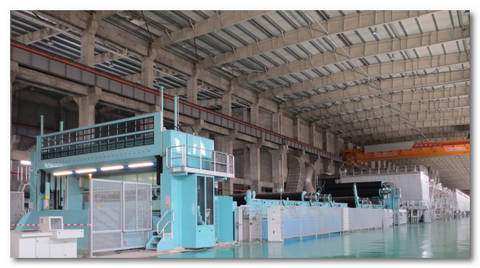
Production on the BM 3 began last year and launched a new chapter in the history of paper and board manufacturer Bohui Paper. Although it is a long-established company from the Chinese province of Shandong, the BM 3 was the first machine going into operation at its Dafeng site in Jiangsu Province, where the company plans to install other board machines. One year after commissioning the paper manufacturer is very contented with the performance of the BM 3 as Huang Ju, Vice President at Bohui Paper, confirms: “After a very fast start-up, we have soon been producing paper of perfect quality. We are very happy to work with Voith, a partner with large technological experience and know-how.”
Proven components, modern technology. With a wire width of 8,750 mm and a total length of 400m, the BM 3 is one of the most efficient board machines ever. It is designed for an annual production of 750,000 metric tons of quadruple-coated ivory board in the basis weight range of 290–340 g/m2. The machine components for the complete production line were supplied by Voith, as were the entire automation technology and the first clothing.
Shandong Bohui Paper Group Ltd.
The Shandong Bohui Paper Group Co., Ltd. was established in 1994. The paper and board manufacturer headquartered in Shandong Province employs 5,000 people and produces ivory board, graphic papers, testliners, kraftliners and plasterboard.
Bohui BM 3: Information on the Voith scope of supply
Headbox and wire section. Three MasterJet III-F headboxes with lamella technology: the headbox with dilution water technology in the intermediate ply ensures optimum cross profiles. The wire section is a conventional three layer wire section with a DuoFormer D on the intermediate ply. The DuoFormer D is one of the latest generation formers from Voith designed for very high dewatering performance. In addition, a DuoShake is used on the intermediate ply for optimum fiber orientation and improved strength values.
Press section. The press section consists of a Tandem NipcoFlex press, followed by an offset press for optimum surface quality. Both NipcoFlex presses are double-felted and designed for a maximum line load of 800 kN/m. A steam blower box is installed upstream of the second nip for moisture cross profile control.
Sizing press and dryer section. The pre-dryer section is normally two-tier, with the first three dryer groups single-tier with DuoStabilizers. The SpeedSizer AT can run in SpeedSizer mode and as a conventional sizing press, in which case Voith SizeWings enable higher operating speeds for starch feeding. At the end of the after-dryer section there is an EcoCal Hardnip calender including upstream nozzle-type moisturizers to obtain optimum smoothness in the base paper. To also achieve optimum smoothness at high speeds, very high temperatures are necessary on the heated roll, so it is fitted with an external FlexiTherm coil.
Coating section and finishing. The coater comprises four DynaCoat AT coating units, each with a JetFlow free-jet applicator, which applies the coating color in a contactless fashion less likely to cause damage. The first two coating units apply the preliminary coat, the third applies the rear coat and the fourth the top coat. The coating is dried by means of InfraAir drying, InfraRed dryers, MCB high-performance dryer hoods and an HCB Turn air drying and contactless web turning system.
A curl correcting section with six drying cylinders corrects the paper curl. The final surface treatment is done by the EcoSoft calender. To reel up the high-quality board without damaging it a Sirius roller with EcoChange reel change system was installed (maximum winding diameter 4.4 m). Two VariFlex winders perform the next process stage.
The automation technology comprises
- the process control system for stock preparation, the wet end process and the steam, condensate, hood and air systems of the board machine.
- the machine-level control for the complete board machine
- the entire quality control system with six scanners and
- the complete machine monitoring system for monitoring the roll bearings.
Clothing. Complete first clothing for the board machine.
Södra's interim report January-April 2014: Positive performance and clear path forward
Södra's operating profit improved to SEK 503 million (loss: 99) during the first four months of the year. The profit increase is primarily the result of higher demand and prices and a lower cost level.
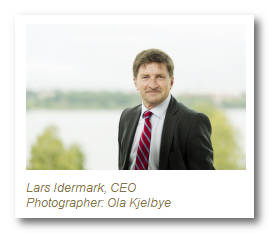 Net revenue amounted to SEK 5,838 million, corresponding to an increase of 5 per cent compared with the year-earlier period. Consolidated operating profit totalled SEK 503 million and all business areas reported positive and improved earnings. Profit after finance income and expenses improved to SEK 477 million. The result includes income of EUR 18.8 million from the sale of equipment from Södra Cell Tofte.
Net revenue amounted to SEK 5,838 million, corresponding to an increase of 5 per cent compared with the year-earlier period. Consolidated operating profit totalled SEK 503 million and all business areas reported positive and improved earnings. Profit after finance income and expenses improved to SEK 477 million. The result includes income of EUR 18.8 million from the sale of equipment from Södra Cell Tofte.
"We have had a good start to the year with favourable performance and better earnings for all of Södra's business areas. The improvement is due to our own efforts and better market conditions. The trend for the remainder of the year is largely dependent on market and exchange rate developments," commented Södra's President and CEO Lars Idermark.
"Södra's path forward is clear and we are working in line with our newly established Group strategy, in which an important step is the expansion of the Värö pulp mill. The project entails an investment of slightly more than SEK 4 billion and an increase in pulp production capacity from the current 425,000 tpy to 700,000 tpy at Södra Cell Värö," Idermark added.
First four-month period, January-April 2014, in brief
- Net revenue SEK 5,838 million (5,538)
- Operating profit SEK 503 million (loss: 99)
- Profit after finance income and expenses SEK 477 million (loss: 99)
- Cash flow after investments SEK 515 million (neg: 118)
Wausau Paper Introduces New Artisan Premium Towel Line
![]() Wausau Paper announced the launch of its new Artisan™ line of premium towels carefully crafted from the Company’s innovative ATMOS technology-enabled paper machine at Harrodsburg, Kentucky. Artisan products are brilliant white, remarkably strong, yet designed to provide a soft and thorough hand drying experience. The toweling has a clean and hygienic appearance as well as cloth-like durability and strength for exceptional performance. Artisan provides the pinnacle in premium while also supporting sustainability initiatives. Artisan is the only line of premium quality roll and folded towels that feature Green Seal™ certification. Towels are made from superior quality 100 percent recycled fibers providing premium appearance and comfort. Artisan towels, with their unique surface pattern, cater to high-end facilities seeking exceptional quality products that reinforce an upscale image.
Wausau Paper announced the launch of its new Artisan™ line of premium towels carefully crafted from the Company’s innovative ATMOS technology-enabled paper machine at Harrodsburg, Kentucky. Artisan products are brilliant white, remarkably strong, yet designed to provide a soft and thorough hand drying experience. The toweling has a clean and hygienic appearance as well as cloth-like durability and strength for exceptional performance. Artisan provides the pinnacle in premium while also supporting sustainability initiatives. Artisan is the only line of premium quality roll and folded towels that feature Green Seal™ certification. Towels are made from superior quality 100 percent recycled fibers providing premium appearance and comfort. Artisan towels, with their unique surface pattern, cater to high-end facilities seeking exceptional quality products that reinforce an upscale image.
“The launch of our new Artisan premium towel line marks the culmination of several years of development and hard work throughout the Company to bring to market premium green,” commented Matthew L. Urmanski, president and chief operating officer. “Artisan is truly a one-of-a-kind product line marrying together the premium attributes traditionally found only in virgin-style products with the environmentally responsibility of Green Seal certification. As we continue to further our goal of becoming a complete green manufacturer across our entire paper brand portfolio, Artisan brings us ever closer to this vision.”
Green Seal™ is a trademark of Green Seal, Inc. in Washington, DC. Used by permission. ATMOS is a trademark of Voith GmBH in Heidenheim, Germany. Used by permission
Petrocart starts up the new Toscotec Tissue Line in Piatra Neamt
At the end of April, the Rumanian tissue producer Petrocart, has successfully started up their new Toscotec complete tissue production line installed in Piatra Neamt, headquarter of the company since 1908.
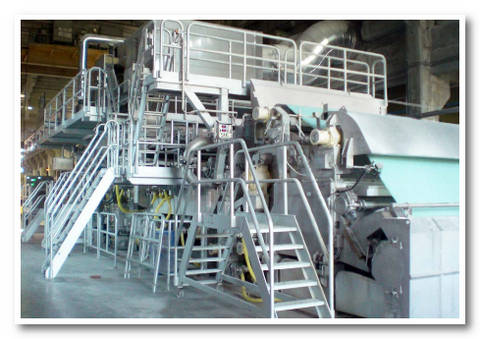
Based on a turn-key concept and an average production of 75 tons per day, the new line includes the stock preparation plant for virgin and recycled fibers, a MODULO-PLUS tissue machine with single-layer headbox, double press configuration and TT SYD-12FT, the tissue machine auxiliary plants including a Milltech hood and steam & condensate system . A three unwind stands tissue slitter rewinder TT WIND-M completes Toscotec scope of supply.
According to Petrocart green philosophy, the project was mainly focused on reduced energy consumption, usage of waste paper, recovery and re-usage of the water in the manufacturing process.
The project has been managed on the turn-key basis by Toscotec providing also the whole engineering services, erection supervision, start-up and training.
Houghton Mifflin Harcourt Introduces Comprehensive Paper Procurement and Usage Policy to Minimize Environmental Footprint
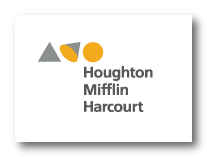 Global education leader Houghton Mifflin Harcourt (HMH) has introduced a new policy on paper sourcing and usage, outlining a commitment to significantly reduce environmental impact by 2018 and beyond. In the document, HMH details an action plan to reduce printed materials by increasing digital content, partner with FSC-certified paper suppliers to ensure responsible sourcing, and increase the use of recycled fibers in all of its printed content.
Global education leader Houghton Mifflin Harcourt (HMH) has introduced a new policy on paper sourcing and usage, outlining a commitment to significantly reduce environmental impact by 2018 and beyond. In the document, HMH details an action plan to reduce printed materials by increasing digital content, partner with FSC-certified paper suppliers to ensure responsible sourcing, and increase the use of recycled fibers in all of its printed content.
“Its comprehensive approach to eliminating controversial suppliers is what we at Rainforest Action Network consider to be a best practice for publishers.”
With the launch of its paper policy, HMH has formalized its goals to reduce usage overall, dispose of paper products responsibly through book donation programs and certified recycling, select progressive, ethical sourcing partners and monitor its progress around sustainability initiatives. The Company will continue to leverage digital resources to share its content, from virtual product sampling to digital curriculum to eBooks, and will convene a Green Paper Task Force to track and publicly report progress against stated goals.
“As an education content provider to students worldwide, HMH is deeply invested in ensuring the planet is a healthy home for learners of all ages to grow and thrive. As a business, we recognize that minimizing our environmental impact increases our efficiency, effectiveness and agility,” said Mary Cullinane, Chief Content Officer and EVP, Corporate Affairs, HMH. “We are supporting this commitment through a variety of projects, including our relationship with the US Green Building Council to ensure our schools are healthy, safe, productive places to learn. We look forward to fulfilling the goals put forward today in our policy.”
The launch of HMH’s policy follows the release of a new report on sustainability practices in the publishing industry from the Rainforest Action Network (RAN), an advocacy group dedicated to environmental protection and public awareness. The report, entitled A New Chapter for the Publishing Industry: Putting Promises into Practice, spotlights HMH’s policy and future goals as industry-leading, and examines the sector’s broader shift away from the use of paper sourced from controversial fiber.
“When fully implemented, this new policy from Houghton Mifflin Harcourt should have a strong, positive impact for Indonesia's forests,” said Rainforest Action Network forest campaigner Christy Tennery-Spalding. “Its comprehensive approach to eliminating controversial suppliers is what we at Rainforest Action Network consider to be a best practice for publishers.”
Please find HMH’s Paper Policy here.
Please find RAN’s report here.
Metso strengthens valve and field device services in Germany by opening a new Service Center in Leuna
Metso has opened a new service center in eastern Germany, in the Leuna industrial area. The new service center supports the company's strategy to grow its valve and field device service business globally and strengthens Metso's service capabilities within the German region for major petrochemical, energy, oil & gas and pulp & paper companies.
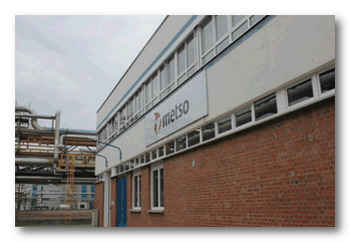 Metso is continuosly investing in its service and production capabilities globally in order to deliver customers secured plant availability while optimizing total maintenance costs. Metso has over 55 automation service hubs, 36 valve and field device Service Centers and over 1,000 service professionals serving automation customers around the world.
Metso is continuosly investing in its service and production capabilities globally in order to deliver customers secured plant availability while optimizing total maintenance costs. Metso has over 55 automation service hubs, 36 valve and field device Service Centers and over 1,000 service professionals serving automation customers around the world.
"Metso's services portfolio focuses on three main areas: solving technical and process issues, improving business performance, and managing a business area. Our maintenance services range from the servicing of individual Metso valves all the way to maintenance and device management solutions for complete plants. We use intelligent solutions to service valves and other field devices from Metso or other manufacturers,'' explains Mikko Keto, President, Services, Automation, Metso.
"The new service center in Germany is in line with our strategy to continuously strengthen our global network of Service Centers and service experts so that we are close to our customers to best support their business needs,'' he continues.
Leading valve technology
Metso's services business is backed by Metso's market-leading valve solutions, which include control valves, automated on/off and emergency shutdown valves, as well as intelligent valve controllers and condition monitoring. Metso's world-leading brands include Neles®, Jamesbury® and Mapag®.
The company is currently building a new Neles globe valve technology center in South Korea. Metso's other valve technology and supply centers are located in Finland, USA, China, Germany and Brazil.
ANDRITZ GROUP: results for the first quarter of 2014
 International technology Group ANDRITZ has presented its results for the first quarter of 2014. The key financial figures developed as follows:
International technology Group ANDRITZ has presented its results for the first quarter of 2014. The key financial figures developed as follows:
- Sales amounted to 1,219.5 million euros (MEUR) and were thus 4.8% higher th an the reference figure for the previous year (Q1 2013: 1,163.8 MEUR). This increase is due to the Schuler Group*; excluding Schuler, sales would have decreased by 8.9% mainly as a result of the project related low sales generation in several business areas.
- The order intake, at 1,742.2 MEUR, saw a very favorable development, rising b y 35.2% compared to the first quarter of 2013 (Q1 2013: 1,288.3 MEUR). The Schuler Group contributed 319.8 MEUR; excluding Schuler, the order intake would have increased by 19.3%, with the PULP & PA PER business area noting a very good order intake.
- The order backlog as of March 31, 2014 increased to 7,734.7 MEUR compared to the end of last year (December 31, 2013: 7,388.5 MEUR).
- The EBITA amounted to 48.6 MEUR (Q1 2013: 14.2 MEUR). Earnings were th us considerably above the very low reference figure of the previous year, which was strongly negatively im pacted by high provisions booked for a pulp mill project in South America, but still failed to reach a satisfa ctory level, as did the EBITA margin at 4.0% (Q1 2013: 1.2%). This is attributable in parti ular to the p roject-related low sales generation and cost overruns on some projects in the PULP & PAPER, METAL S (excluding Schuler), and SEPARATION business areas.
- Net income (excluding non-controlling interests), at 20.7 MEUR, was significantly above the very low reference figure for the previous year (Q1 2013: 4.1 MEUR).
On the basis of this business development, the order backlog, and the sales contribution by the Schuler Group, which was not included in the accounts for full twelve months in 2013, the ANDRITZ GROUP expects a slight rise in sales in the 2014 business year compared to the previous year. The net income is currently expected to show a significant improvement compared to the low level in 2013.
* First-time consolidation of Schuler: March 1, 2013; thus in Q1 2013 included for one month only
See below for the attached file for the Key Financial Figures
Replacement of CD profiling actuators made easy, even in single units
Until now paper mills have had to either renovate a worn out dilution actuator at a high cost, or to replace all actuators simultaneously and invest in a costly CD weight system replacement, if original spare parts are no longer available.
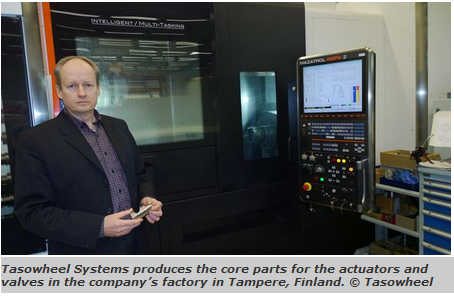
The dilution actuators are a key quality factor in the paper production process, since they adjust how uniformly the headbox distributes the stock onto the wire in the beginning of the process. The stock consistency in machine cross direction (CD) is an important quality property, since it defines the most of the paper basis weight profile on which all other sheet variations depend.
To reach an even weight profile, each actuator regulates a valve that adds dilution water into the stock flow according to the set points given by the CD profiling control software. For this reason the speed, accuracy and build quality of the CD control actuators are essential for the dilution profiling since the actuators are operating 24/7.
“The reliability and condition of the profiling actuators and valves are key factors behind an undisturbed process in a paper machine”, says Jukka Ahlstedt, Sales Manager at Tasowheel Systems. “The CD control algorithms expect that the calculated new set points for each actuator are realized accurately and fast and that the response on the process is consistent. As the running speed of a paper machine can be up to 2,000 m/min, any delay in the control action that causes process upsets or broke, will cost a lot of money.”
Precision electro mechanics
Tasowheel has delivered more than 200,000 dilution actuators and valves during the past 30 years. But since the products have been branded Metso, Voith or ABB, surprisingly few customers know who the real manufacturer is.
“Our products are made solely of AISI 316 stainless steel”, Ahlstedt says. “The flow surfaces of the valves are hard coated to reach long life time and to give an outstanding resistance against wear, which can change the flow curves and cause quality and runnability problems.”
Tasowheel is a preferred partner to the leading paper machine manufacturers. But now, as old mills are shutting down rather than new ones opening up, optimizing existing processes has become more and more important for the company’s customer service.
“And we are not only talking about paper machines that need service”, Ahlstedt says. “A lot of paper machines are converted to produce different paper grades and even whole plants are relocated. In all these cases new actuators and valves are needed. With our products it is possible to replace practically any type of dilution actuator and valve on the paper machines today, regardless of the original manufacturer.”
Zone by zone
One new customer for Tasowheel is Papel Aralar, a leading manufacturer of specialty paper in Spain. The mill in the northern part of the country has three paper machines and the company exports to a good 30 countries on five continents. Aralar is known for its flexibility to adapt the production according to the customers’ varying needs.
Last year the company decided to renew the old CD actuators and valves in one of the machines. The problem was, however, that the original spare parts were not available anymore.
”Another possibility was to renovate the actuators and valves, but that was not really what we wanted to do”, the Technical Manager at Aralar says. “When we became aware that Tasowheel Systems could replace the actuators and valves with brand new parts even in single pieces, we decided to check out this option regarding two of the most critical units."
The two new actuators and valves were installed and tested in one working day during a pre-planned shutdown in August 2013. According to Jukka Ahlstedt, the unit price was lower than what a renovation of the old actuators and valves would have cost.
“As our actuator cables fit directly to the I/O control cards of existing CD actuator system, neither the quality control system (QCS) nor to the CD control system had to be altered”, Ahlstedt says.” Only some minor modifications had to be done to the existing actuator support plates to fit the new actuators with the original fastening points.”
After having tested the new actuators under real circumstances for a couple of months, the customer ordered a change of the next 25 actuators to be made at the turn of the year.
“Since we knew the exact specifications, we could this time do all the modifications in advance, which made the replacements a real plug-and-play operation”, Jukka Ahlstedt says. “As a result, also this far more extensive project was completed in one working day. Now we are discussing similar projects with several paper mills all over Europe.”
SCA first Swedish listed company to issue green bond
As the first Swedish listed company, SCA has raised SEK 1.5 bn through a green bond issue. The bond proceeds will be used for investments in projects with a positive environmental impact.
The bond, which is denominated in Swedish krona (SEK), has a five-year tenor and is issued under the company's EMTN (Euro Medium Term Note) program. The bond has two tranches. One tranche 1 billion floating rate note, priced at three-month STIBOR +0,68% annually and one SEK 500m fixed rate tranche with an annual coupon of 2,5%. SCA's green bond offer was oversubscribed. The bond was placed with approximately 30 investors.
Green corporate bonds are relatively new in the bond market
For SCA, the globally leading hygiene and forest products company, sustainability is a crucial and natural part of the business model.
"SCA's sustainability activities are based on the creation of financial, environmental and social value. Each of these components holds equal importance in the drive to create a successful company. SCA's position as the first listed company in Sweden to offer a green bond is further confirmation of how important and highly prioritized our sustainability work is," says Jan Johansson, President and CEO of SCA.
Examples of investment areas for SCA's green bonds are renewable energy and energy efficiency.
Polyacrylamide Market - Global Industry Analysis, Size, Share, Growth, Trends & Forecast 2013 - 2019
![]() Research and Markets has announced the addition of the "Polyacrylamide Market - Global Industry Analysis, Size, Share, Growth, Trends & Forecast 2013 - 2019" report to their offering.
Research and Markets has announced the addition of the "Polyacrylamide Market - Global Industry Analysis, Size, Share, Growth, Trends & Forecast 2013 - 2019" report to their offering.
The revenue generated by the global polyacrylamide market was USD 3,953.1 million in 2012 that is expected to grow to USD 6,915.2 million by 2019, growing at a CAGR of 8.4% from 2013 to 2019.
Cationic and anionic polyacrylamide accounted for the largest share of the polyacrylamide market in terms of both volume and revenue. Anionic polyacrylamide dominated the global market with slightly over 41% share of total volume consumed in 2012. Non-ionic and homopolymer and copolymer polyacrylamide are the other key product types used in the market. The Polyacrylamide industry exhibits high degree of backward integration as majority of polyacrylamide producers are also engaged in the production of its key raw material acrylamide.
The ionic characteristics of polyacrylamide make it a suitable material for use as a coagulant and flocculant. Coagulants and flocculants are the materials used to separate solids from liquids. Due to these properties polyacrylamide is extensively used in water treatment applications. Polyacrylamide is also useful as a friction reducer in petroleum applications that enhances the oil recovery in oil fields. The important application of polyacrylamide is paper making where polyacrylamide is used as a binding agent. Polyacrylamide is used as a soil conditioner in agricultural applications.
Water treatment and petroleum are the major applications of polyacrylamide. With over 39% share in total consumption in 2012, the water treatment application dominated the global polyacrylamide market. Growing environmental concerns about waste water and the harmful constituents present in it, is expected to drive the market for polyacrylamide used in municipal and industrial waste water treatment plants. Petroleum application segment is one of the fastest growing end user industries in the polyacrylamide market. Growing mining activities across the globe is anticipated to increase the demand for polyacrylamide used in mining. Similar surge in demand is expected to be witnessed from shale gas extraction facilities where polyacrylamide is used as a friction reducer for economical oil recovery.
Key Topics Covered
- Preface
- Executive Summary
- Polyacrylamide - Industry Analysis
- Polyacrylamide - Product Segment Analysis
- Polyacrylamide - Application Segment Analysis
- Polyacrylamide - Regional Analysis
- Company Profiles
Companies Mentioned
- Anhui Jucheng Fine Chemicals
- Ashland
- BASF
- Beijing Hengju Chemical
- Feixiang Group of Companies
- Kemira
- PetroChina
- SNF Group
- Shadong Polymer Biochemicals
- The Dow Chemical Company
- Tianrun Chemicals
- ZL Petrochemicals
